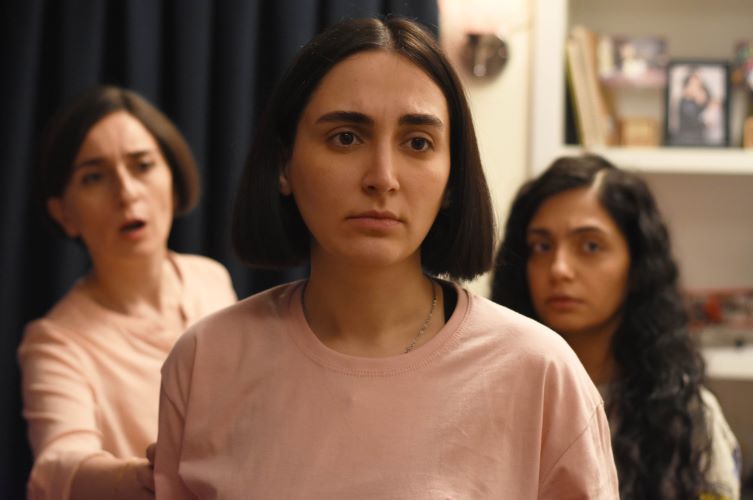
Opening the 40th Haifa International Film Festival, renowned Iranian director Mohammad Rasoulof’s (There is No Evil) The Seed of the Sacred Fig is a powerful, compelling film that held me in suspense for all its 167 minutes. The story of how this remarkable film was made would supply ample material for a thriller, but for now I’ll focus on the film itself. Set in present-day Iran, the film depicts a family leading a relatively comfortable life in Tehran. Iman (Missagh Zareh) is a government worker who has just received a promotion, and a new accessory: a gun. Cue Chekov, yet not in the precise way one might expect, and that is one of the strengths of the film. Najmeh (Soheila Golestani) his wife, is supportive and proud of her husband, excited about the possibilities that this promotion opens, and determined to do what it takes to ensure Iman and the family’s success. Yet the couple’s two daughters have a different perspective on the elements of a good life. Rezvan (Mahsah Rostami) is about to begin college and is expanding her horizons socially and otherwise, while the younger daughter Sana (Setareh Maleki), like many teenagers, has fun painting her nails, and hopes her mother will finally let her dye her hair blue.
Outstanding performances by all four actors slowly reveal different aspects of each of these four characters, as they respond to events, making critical, and often risky choices. Each of these individuals is under extreme pressure, and that pressure impacts the relationships within the family, with an ever-widening gap between the parents and their two daughters. The timeless issue of religion and state, and the boundaries between the personal and the political, take on a very immediate and relatable aspect as Sana, immensely agitated, asks her father why he is intent on intervening in her relationship to God. The family drama takes place against the backdrop of the massive protests that came in the wake of Mahsa Amini’s death in 2022. Scenes of demonstrations included in the film were edited from videos taken on phones during the 2022 protests in Iran. The dramatic narrative had my heart pounding, moved by the brilliance of its artistry, and the awareness that this is the reality of life under an oppressive regime, filled me with foreboding.
There will be screenings of The Seed of the Sacred Fig on January 5th & 8th.
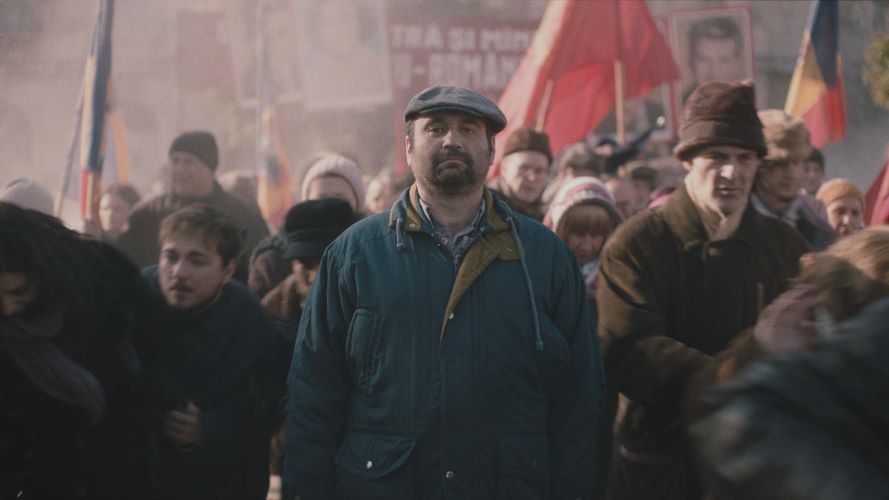
Bogdan Muresano’s The New Year That Never Came is a brilliant debut feature set in Romania of 1989, just before the revolution and fall of Ceausescu, with all of the action taking place over the course of one December day in the lives of several different protagonists. By focusing on the private lives of individuals, Muresano, much like Rasoulof, emphasizes the insidious ability of oppressive regimes to enter and alter our minds and feelings. Sometimes to the extent that we no longer recognize the people closest to us, we no longer recognize ourselves. Fear and anger lead some to submission, some to hopelessness, some to desperate action, and others to small, yet risk-filled, acts of rebellion. Yet, The New Year that Never Came is not bleak, but rather infused with a dark humor, the kind of humor that often grows in an environment of oppression. I love the way that characters who are in the background of one narrative thread are in the center of another, and the entire ensemble of actors deliver strong performances.
There will be a screening of The New Year that Never Came on January 9th.
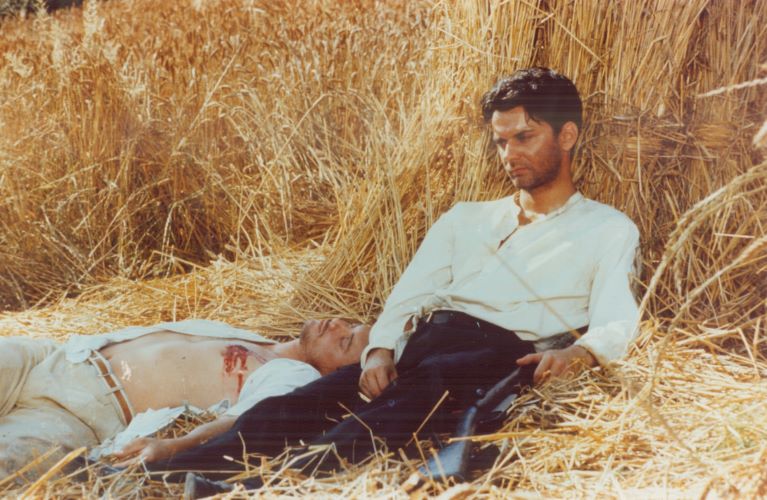
The Haifa Classics program is always one of my favorites, and this year features several films by Paolo Taviani and Vittorio Taviani. To watch a Taviani Brothers film is to be in the presence of brilliance, its sheer pleasure. Their characters are always so vivid and colorful, they know them so well, each glance and gesture captured by the camera conveys depths of personality and experience. Their pacing is so precise, knowing exactly when to let the action move swiftly, sometimes so fast it takes your breath away, and when to go slowly, savoring the moment and letting it build. The Taviani Brothers films to be screened are: Allonsanfàn; Good Morning, Babilonia; St. Michael Had a Rooster; Padre Padrone; and my favorite – The Night of the Shooting Stars.
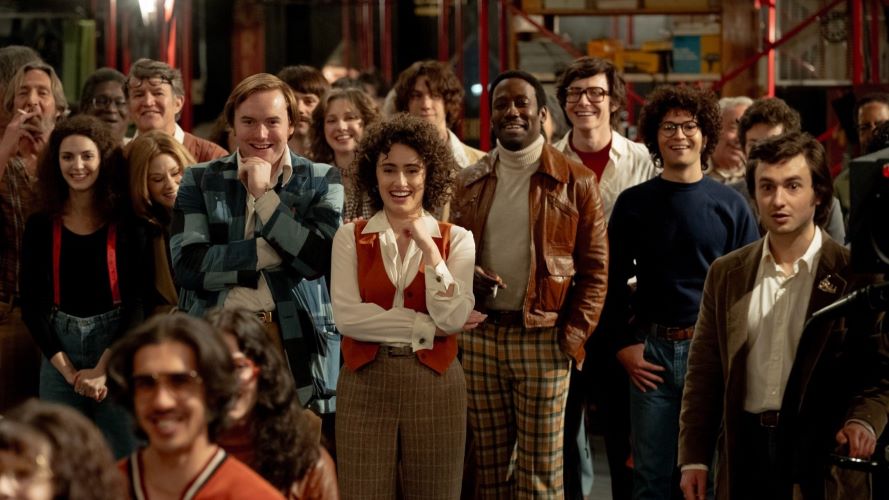
One of my fondest memories from my high school years is staying up late on Saturday Night to watch the amazing cast, the “Not Ready for Prime Time Players” on Saturday Night Live. Remember, these were the olden days, streaming did not exist, and even cable had not yet come into its own, so viewers were entirely at the mercy of the networks and what they (or rather the commercial sponsors) thought America wanted to see. Jason Reitman (Juno, Up in the Air) captures the audacity, creativity, vision, and brilliance of Lorne Michaels and the talented team he assembled, who created something exciting, hilarious, and unique. The film recreates the 90 chaotic minutes leading up to the very first show, based on extensive research and interviews. It’s a wild, fun, ride and evokes the outrageous, zany, spirit of Saturday Night Live. The cast deliver terrific performances as they depict the original SNL cast and creative production team. It’s not an easy task as they all have gone on to become so well known that any slight exaggeration, voice or gesture that’s a bit off would have ruined the entire effect. Instead, there is the uncanny feeling that one is watching a documentary, and that someone had the prescience to film the backstage antics and neuroses of the first show.
There will be a screening of Saturday Night on January 10th.
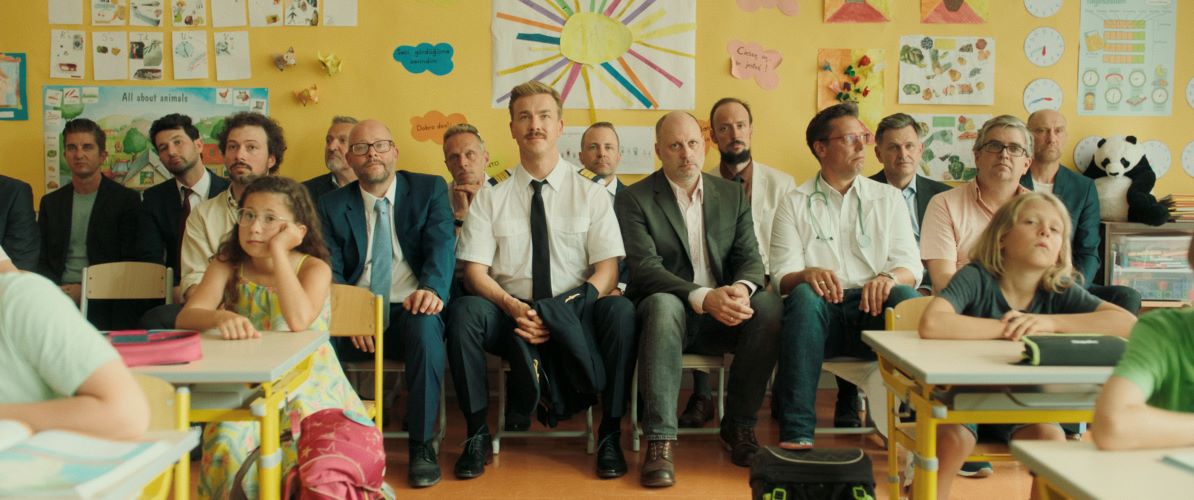
Yet another exciting debut feature, quirky and comic, is Bernhard Wenger’s Peacock. Albrecht Schuch stars as Matthias, a handsome man with a unique profession. He works as a paid companion, but it’s not what you might think. People hire Matthias to play the part of a loving son who gives a touching speech at his father’s 60th birthday party or take on the role of a missing parent when it’s “bring your dad to school day.” He excels at his job, and, one might certainly argue, fulfills an essential role in a world in which people often feel isolated, disconnected, and alone. Not that Matthias can really change those feelings… or can he? Wenger explores the transactional and performative quality of human interaction, as well as issues of identity. In that sense, there is a connection between Peacock and the more explicitly political films discussed here: when playing a role, either by choice or because it is externally imposed, is it possible to retain a sense of identity as distinct from that role? Rasoulof and Muresano raise thought-provoking questions in their films – if we conform and make concessions to a corrupt, malevolent, and oppressive regime, does that not then make us a part of that corruption and evil? And in a film that is laugh-out-loud funny, Wenger addresses similar issues: if so much of our life is pretense and posing, what is real? What is true? How can we trust anyone? How can we trust ourselves?
Peacock will be screened on January 9th.
Screening locations and times, as well as tickets, are available on the Haifa International Film Festival website.





